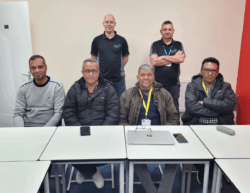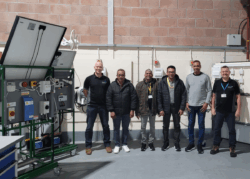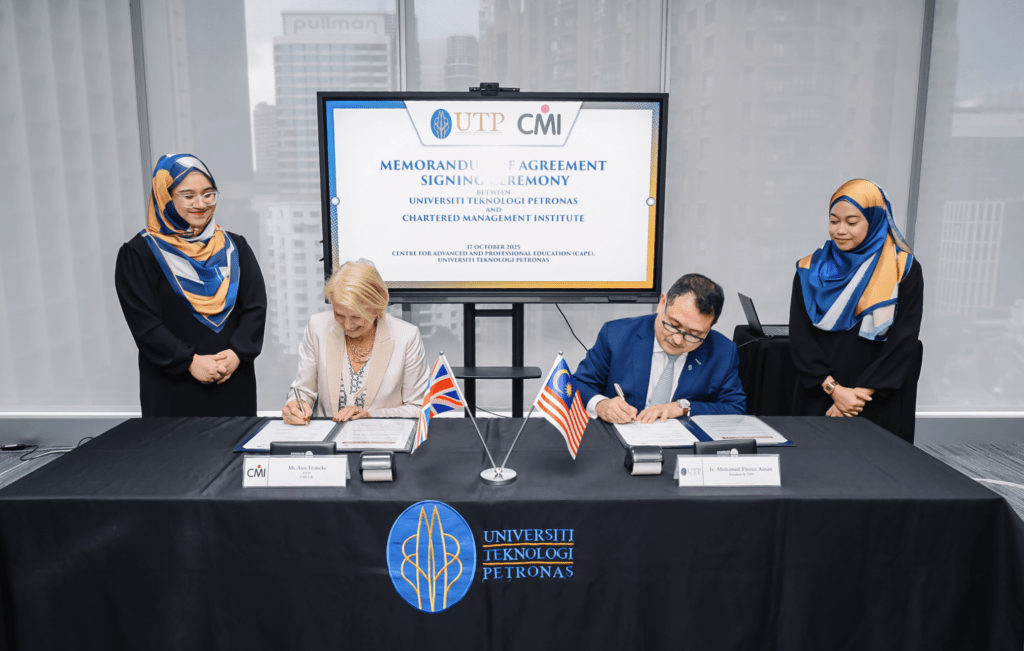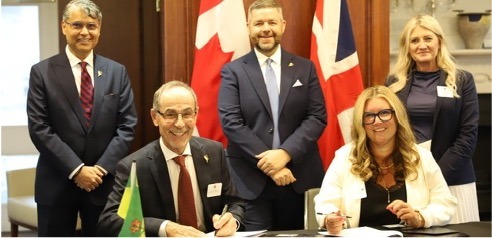
CAVC Green Transition Training in Mauritius
This case study relates to a British Council funded project to work with partners in Mauritius on green technology initiatives to support the transition to net zero. The project was divided into a skills training and curriculum development strand.
The train the trainer strand of the project involved the hosting of four visiting trainers from Mauritius, representing three training providers, who undertook green technology micro-credentials in Electric Vehicle Charging, Electrical Energy Storage, and Environmental Awareness during their week’s stay in Cardiff. All trainers successfully passed these short courses and received certification from the Awarding Body concerned. This will enable their Institutions, working in collaboration with the Mauritius Qualifications Authority (MQA), to offer these short programmes on the island as part of a capacity and capability building strategy for the green sector.
The curriculum development strand including important preliminary work on developing a green technology curriculum framework for Mauritius with particular reference to short vocational programmes or micro-credentials at Levels 2 and 3. This, to some extent, mirrors the expansion of green technology training options in the UK, an approach which has the advantage of accelerated market entry.
A list of potential short programmes currently delivered in the UK was identified by way of sampling the green technology portfolio of a sub-set of UK Awarding Organisations. These programmes are predominantly credit bearing, unlike initial curriculum development activity in Mauritius in the green technology vocational training space which has thus far produced a series of unregulated programmes. The intention is for further discussion and collaboration to take place to prioritise the introduction of strategically important short programmes available from UK Awarding Organisations to receive recognition from the Mauritius Qualifications Authority (MQA).
Contact UK Skills Partnership

Raising public awareness of the green technology agenda in Mauritius as a means of helping to tackle climate change was one of the objectives of the partnership. To that end, the project generated social media posts designed to increase public consciousness of the issues.
The work also helps to cast light on attitudes, perceptions and perspectives among young people studying technology or science related subjects in both the UK and Mauritius, given this is the likely cohort from which many entrants to the green technology sector will emerge. A survey completed by a sample of students both in Cardiff (n=100) and Mauritius (n=79) revealed interesting findings such as the observation that a much higher proportion of technology students in Mauritius would consider green technology as a vocational/career choice compared to technology students studying at CAVC. This may be due to the increased vulnerability of Mauritius to climate change effects.
Cardiff and Vale College [CAVC] is a large, publicly funded Further/Higher Education College located in Wales. By student volume, it is in the top five biggest colleges of its kind in the UK. The history of CAVC is grounded in Technical and Vocational Education and Training (TVET) and the provision has evolved to deliver a range of programmes from Levels 2 through to Level 6 in vocational, professional, and academic courses including apprenticeships. These programmes are delivered in partnership with a range of Awarding Organisations including the Institute of Leadership and Management (ILM), Pearson, City & Guilds, AIM Qualifications, EAL, and some UK Universities.
In terms of technical and vocational education and training [TVET], the College works collaboratively with employers, responding to their needs by developing talent pipelines, upskilling, and reskilling workforces to equip them with specific capabilities needed for the 4th Industrial Revolution, and to close skills gaps in rapidly evolving domestic and global labour markets. The College employs a range of experts in the wider pedagogic space who can contribute insights into, for example, modern vocational education methodologies and practices, curriculum design, and labour market intelligence.
The climate emergency is material and a pressing global challenge. To tackle it requires commitment, investment, innovation, and resolve. The TVET sector has a significant part to play in terms of training providers, and related stakeholders, supporting the green technology sector to decarbonise.
Geographically, the focus of the challenge in this project is Mauritius. A country which declared a state of climate emergency in 2021, and whose government has set targets to reduce greenhouse gasses by 40%, and to increase the share of renewable energy in the energy mix to 60% by 2030. Meanwhile in 2019, the Welsh Government passed a declaration to become the first parliament in the world to officially declare a climate emergency. This project therefore addresses challenges and opportunities for both countries.
The climate emergency creates an opportunity for TVET to provide solutions based on skills and curriculum development to positively impact the green technology education ecosystem in Mauritius and bring about sustainable change. Ultimately the intention is to make a contribution to increasing the capacity and capability of the green technology sector on the island. In addition, it is expected the work will also promote reflection on the UK approach to building its green technology curriculum particularly in terms of short programme and micro-credential options.
Four of the five partners in this project are all vocational training providers in Mauritius with current or planned green technology provision. These institutions were:
- Mauritius Institute of Training and Development
- College Technique, St Gabriel
- Kolektif Rivier Nawr
- Academy of Design and Innovation
The curriculum development work was undertaken in collaboration with the Mauritius Qualifications Authority
The project first asked a fundamental question. What is the most efficient and effective way to skill and upskill the green technology sector in Mauritius? To answer this, we undertook an audit to establish the current baseline of existing provision of green technology curricula on the island, inclusive of level, topic area, duration (short/long programme), and both part-time and full-time options.
Following this analysis, it was decided to adopt a pragmatic approach, by starting with micro-credentials as a means to accelerate the provision and availability of flexible, accessible, and cost-effective training. This exercise led to CAVC producing a diet of green technology, skill related micro-credentials ranging from 1-4 days in duration, from which the training providers in Mauritius could select their preferences.
This train the trainer component of the project was highly successful with four trainers, representing three training providers, securing accredited micro-credential certification in Electric Vehicle Charging (Level 3), Electrical Energy Storage (Level 3), and Environmental Awareness (Level 2) during their week’s stay in Cardiff. This certification will enable their Institution, working in collaboration with the MQA, to offer these short programmes on the island, a model that can serve as a blueprint for further train the trainer activity particularly in the solar and wind energy power domains.
In addition to the skills training component of the project, a list of other potential green technology related short programmes currently delivered in the UK was identified by way of sampling a sub-set of Awarding Bodies. These are predominantly credit bearing, unlike initial curriculum development activity in Mauritius in the green technology vocational training space which has thus far produced a series of unregulated programmes. The intention is for further discussion and collaboration to take place to prioritise the introduction of strategically important short programmes available from UK Awarding Bodies to receive recognition from the MQA for subsequent delivery on the island.
The project seeks to help reform, change, and shape green technology training in Mauritius, whilst informing developments in the UK.
CAVC sees this work as providing a stimulus to expanding the introduction of a series of short green technology related courses into the Mauritian ecosystem, and thereby contribute to informing the MQA’s systemic ambition to create a national micro-credential framework for TVET provision. This is an interesting development as it more easily distinguishes the national micro-credential offer.
In the UK, by way of contrast, micro-credentials are essentially integrated into the existing National Qualifications Frameworks, where they are considered credit-bearing units that align with specific levels, allowing them to be recognised and compared against other qualifications across the UK education system. Arguably this structural/presentational approach may serve to slightly obscure the availability of micro-credentials in the UK. It may also exclude strategically useful non-regulated micro-credentials. The project has therefore given us an insight into the utility of micro-credentials as a means of upskilling for the green technology sector at pace.
This work clearly adds to CAVC’s growing profile in this space. Staff have greatly benefited from the technical and cultural interaction with colleagues from Mauritius. The College has also developed a series of positive relationships with Institutions in Mauritius upon which to build. Further green technology export opportunities and projects will be further enhanced by the development of a new, Advanced Technology Campus due to open in 2027 in the Vale of Glamorgan, with the capacity to accommodate nearly 2,000 learners. Courses at the campus will be focused on supporting economic development and meeting the skills needs of employers including in green skills. The campus will include a “green skills house” which will underpin the learning and teaching of areas such as solar energy, heat pumps, battery technology, recycling, and other net zero initiatives.
The training providers in Mauritius will have the opportunity to add new and attractive green technology micro-credentials to their TVET portfolios, thus supporting the preparation of local students for the jobs of tomorrow providing much needed protection to the natural environment.
What has changed? It is fair to say that several things have already changed, and it is anticipated other changes will evolve post-project. The immediate changes are around increases in knowledge and understanding, skills and competencies, and cultural awareness for those involved in the project. Further medium and longer-term changes will include the emergence of a national green technology curriculum, expansion of a strategic micro-credential offer in green subjects, and, consequently, an uptick in capacity and capability building on the island.













